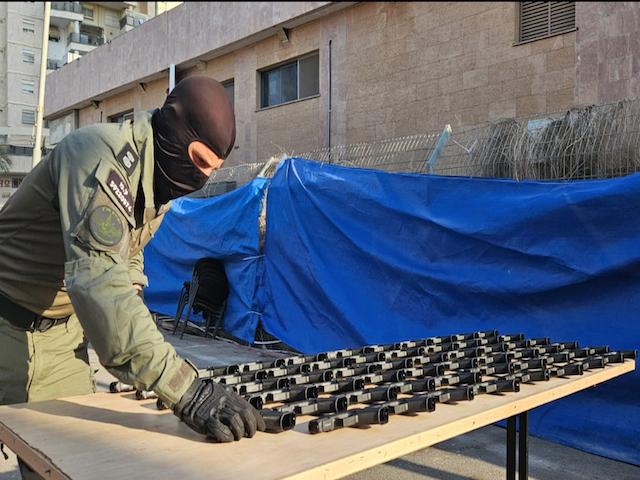In a dramatic development that highlights the ongoing security challenges Israel faces along its borders, Israeli authorities successfully intercepted a significant arms smuggling attempt from Jordan. On the same day as a deadly attack at the Allenby Bridge Crossing, customs inspectors at the Rabin Crossing near Eilat discovered 74 Glock pistols and 61 magazines hidden inside a Mitsubishi vehicle attempting to cross into Israel from Jordan. This incident raises serious questions about the supposed peace and cooperation between Israel and its neighboring countries.
Security Breaches and Questionable Alliances
The smuggling incident comes amid a backdrop of growing security concerns along Israel's eastern border with Jordan. Typically, vehicles undergo stringent inspections on both sides of the border. However, in this case, Jordan allowed the vehicle to pass through to the Israeli side, suggesting a lapse or a deliberate oversight by Jordanian authorities. This breach of protocol raises doubts about the genuine nature of the peace Israel shares with Jordan, a country that is ostensibly committed to curbing illegal arms trafficking and maintaining regional stability.
Yesterday, a Jordanian terrorist murdered three Israeli workers at the Allenby Border Crossing between Israel and Jordan.
— Israel War Room (@IsraelWarRoom) September 9, 2024
Also yesterday, at the Israeli-Jordanian Rabin Border Crossing near Eilat, two suspects were arrested trying to smuggle 74 guns into Israel from Jordan.… pic.twitter.com/rndPn9GQM2
The individuals involved in the smuggling attempt, residents of the Bedouin town of Bir Hadaj and another Bedouin community near Yeruham, have been detained for further investigation. This incident underscores the ongoing struggle Israel faces in combating arms smuggling along its extensive and often porous borders, where criminal and terrorist elements frequently exploit gaps in security.
Iran’s Shadow Looms Large
Israeli officials have noted an uptick in efforts by Iran to smuggle weapons to terror groups operating in the West Bank. This increase in illicit arms trafficking is part of a broader strategy by Tehran to destabilize the region and empower groups that threaten Israel’s security. Additionally, many of the weapons smuggled into Israel have been linked to organized crime, exacerbating the country’s internal security challenges.
74 guns smuggled through Jordan to Israel intercepted pic.twitter.com/dKV4CPbQKX
— Open Source Intel (@Osint613) September 9, 2024
Egypt’s Double Game: A "Peace Partner" in Name Only
The recent smuggling attempt comes on the heels of revelations about another so-called "peace partner" of Israel, Egypt, which has not only turned a blind eye to weapons smuggling but is reportedly profiting from it. Despite Israel's extensive assistance to Egypt in its fight against ISIS in Sinai, including allowing Cairo to deploy additional troops beyond the limits set by the 1979 peace treaty and conducting bombing raids at Egypt’s request, Egyptian officials have been complicit in smuggling operations.
Reports suggest that smuggling is not confined to underground tunnels but is also facilitated through official crossings like Rafah, with the involvement of senior Egyptian officials. Smuggling has become a multibillion-dollar industry in Egypt, with key figures like Mahmoud el-Sisi, the son of President el-Sisi and deputy head of the Egyptian General Intelligence Directorate, allegedly deeply involved. Alongside businessman Ibrahim al-Organi, dubbed the “King of the Rafah crossing,” these individuals are said to control the lucrative smuggling routes that fuel instability in the region.
Embarrassment regarding his insufficient anti-smuggling efforts might explain why Sisi was so concerned about Israeli operations along the Egypt-Gaza border. For months, Rafah remained Hamas’ last bastion in Gaza, write @DavidSamuelMay and @HaisamHassanei1:https://t.co/UGGomXqrYD
— FDD (@FDD) July 16, 2024
Egypt’s Shifting Alliances with Hamas
Under President el-Sisi’s early rule, Egypt viewed Hamas, an offshoot of the Muslim Brotherhood, as a threat and actively fought against smuggling that empowered the group. Hamas had previously aligned with ISIS elements in Sinai and participated in high-profile terrorist attacks within Egypt, including the assassination of Egypt’s chief prosecutor in 2015. However, the dynamic shifted in 2017 when Yahya Sinwar became the head of Hamas in Gaza. A deal brokered between Hamas and Egyptian intelligence allowed the group to operate with relative freedom in exchange for ceasing attacks on Egyptian soil and securing the Rafah crossing's round-the-clock operation.
Israel’s Growing Security Challenges
The latest smuggling attempt is not an isolated incident but rather a symptom of a broader and more alarming trend. The peace agreements Israel has with neighboring Arab states are increasingly being undermined by clandestine activities that suggest these nations may be acting in bad faith. While fear of internal extremist factions partially drives these actions, the reality remains that Israel’s security challenges are far more complex and pressing than initially anticipated.
The son of Egyptian President Sisi has a large financial stake in these smuggling activities. So Egypt would do anything to keep Israel from entering Rafah.
— Mr. Kitty 🇮🇱 (@Sassy_Khat) May 26, 2024
Turkey has now joined in the case as well. President Erdogen gives political and financial support to violent militants-
This situation calls for a reassessment of Israel's regional relationships and security strategies. As Israel continues to face threats from both state and non-state actors, the importance of vigilance, robust intelligence, and strategic countermeasures cannot be overstated. The country’s ability to navigate these challenges will be crucial in ensuring its long-term security and stability in an increasingly volatile region.


